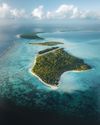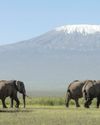
was expecting to spend most of my time in Fiji, a nation of more than 300 islands, on or in the water, but I'd mostly been thinking of ocean. Yet on a warm morning in May, I found myself deep within the mountainous interior of Fiji's largest island, Viti Levu, roaring in a red jet boat down a winding, mudbrown river, past sheer cliffs, dense jungle, and gentle banks where locals watered their horses or fished for tilapia or mud crabs. The river was one of Viti Levu's longest, the Sigatoka, whose fertile, farmable banks are known as Fiji's "salad bowl."
After a while, the boat driver, an Indigenous Fijian who introduced himself as Captain Nox, steered us into some shaded shallows and cut the engine to tell his 14 passengers a story. Missionaries and reverends, back when the nation was first ruled by the British, in the late 1800s, met their violent deaths along these riverbanks at the hands of the island's tribal members, at times for committing acts of tabu (or taboo, as Captain James Cook imported the word to English in 1777) like touching people's heads. "Fiji was the worst cannibal island," Nox said. "But now Fiji is the friendliest island, eh?"
It's true; nothing compares to the plosive enthusiasm of the Fijian greeting: "Bula!" It's a word that floats like a bubble. Everyone says "Bula!" to everyone, even passing strangers. And historically, many have passed through here. A crossroads in the heart of the South Pacific, Fiji spans from eastern Melanesia, the region populated in prehistory by ethnically African people, into the western edge of Polynesia, which was inhabited later, by people who migrated from Southeast Asia by outrigger and double-hulled canoe. A little more than half of Fiji's 900,000 people are Indigenous, or iTaukei, and nearly 40 percent are ethnically Indian, descended from indentured laborers brought to work on sugar plantations during the British colonial rule.
This story is from the November 2022 edition of Condé Nast Traveler US.
Start your 7-day Magzter GOLD free trial to access thousands of curated premium stories, and 9,000+ magazines and newspapers.
Already a subscriber ? Sign In
This story is from the November 2022 edition of Condé Nast Traveler US.
Start your 7-day Magzter GOLD free trial to access thousands of curated premium stories, and 9,000+ magazines and newspapers.
Already a subscriber? Sign In

The Brando
THE STORY GOES that actor Marlon Brando first arrived on the 18-isle atoll of Tetiaroa by water-as in, he swam ashore.

Jumeirah Burj AI Arab
IF EVER THERE WAS a hotel that could achieve landmark status, it is Dubai's Jumeirah Burj AI Arab, which stands alone on its own purpose-built island just off Jumeirah Beach.

Blackberry Farm
BLACKBERRY FARM LOOMS in the consciousness of many travelers as an almost mythical Southern sanctuary in the foothills of the Great Smoky Mountains, a place whose storybook perfection has to be experienced to be believed.

Fogo Island Inn
THIS 29-ROOM MODERN CLASSIC in Newfoundland is a model for place-specific hospitality, dreamed up by founder Zita Cobb and built by Shorefast, a nonprofit that supports economic and cultural resilience on the hotel's namesake island and runs artist residencies in four isolated, incredibly photogenic studios.

ALAN CUMMING on CROSSING THE ATLANTIC
I went on Cunard's Queen Mary 2 for the first time in 2011.

high life
Italy's unfussy Dolomites are a place of cheerful communities, where simple chalets and good food can almost outshine the skiing

the possibility of an island
Cuba may be facing tough times, but the country's hoteliers, creators, and artists are forging a hopeful and beautiful way forward

in full bloom
Over the past three years, hotelier Fabrizio Ruspoli has turned an old olive farm south of Marrakech into the High Atlas's most intoxicating garden retreat

ALLIN
Fun has never been hard to come by in Las Vegas, but the arrival of pro sports, the Sphere, and lavish new hotels has upped the ante.

Forward March
Across Kenya, community initiatives are protecting the country's wildlife and environment. By Mary Holland